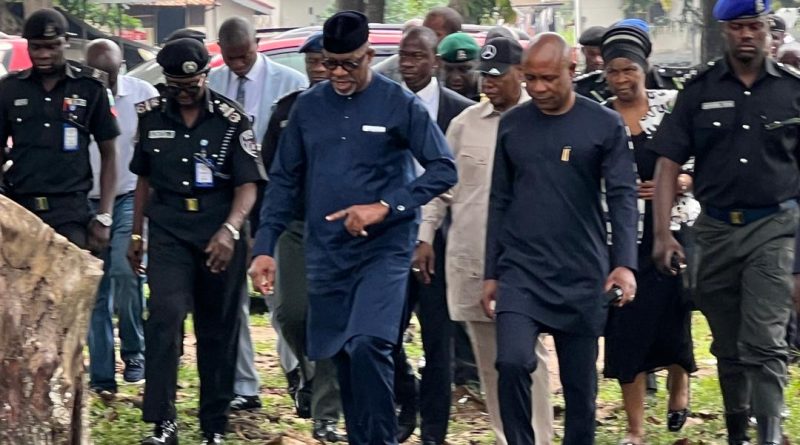Nigeria’s $1 trillion economy target tied to security reform, says NEC Committee
…As Tinubu declares emergency on security training infrastructures
The National Economic Council (NEC) Committee on the Overhaul of Security Training Institutions on Tuesday began an on-the-spot assessment of police training facilities in Lagos, declaring the effort a crucial step toward achieving President Bola Tinubu’s ambition of building a $1 trillion economy by 2030.
The ad-hoc committee, chaired by Enugu State Governor Peter Mbah, visited the Police College, Ikeja, where he described the state of infrastructure as consistent with what the president had already recognised, the urgent need to restore pride, professionalism, and confidence to Nigeria’s security services.
“I think what we have seen here today is just consistent with what the president has already recognised when he came to the council chamber on the 23rd of October and personally approved the inauguration of this ad hoc committee,” Mbah told journalists after the tour.
“The president recognised that there is a need for bold and urgent steps to restore the pride, professionalism, and confidence of our men and women in the security space, and that’s what we’ve just come here to validate.”
He emphasised that the committee was treating the exercise as an emergency intervention. “The president saw this as an emergency and this is an intervention. What we hope to achieve is the rebuilding, renovation, and re-equipping of these training institutions,” Mbah said.
Read also: Nigerians want results, not excuses, Tinubu tells service chiefs
The committee was constituted on October 23 under Tinubu’s directive and given 30 days to submit a report to NEC, detailing cost estimates and plans for upgrading all police and security training institutions across the country.
Mbah explained that the overhaul aligns with the president’s economic vision. “The president committed to a $1 trillion economy in five years, but that growth will largely come from private sector investment, and that won’t happen if we do not have a safe and secure environment,” he said.
“You cannot have socioeconomic development in an atmosphere of insecurity or in an under-policed environment.”
He noted that Tinubu’s approval for the recruitment of 30,000 additional police officers would be meaningless without proper training infrastructure.
“That cannot be implemented if we do not have the institutions and facilities to train this personnel,” he said.
The committee, made up of seven governors, a retired Inspector-General of Police as secretary, and other senior police officers, has divided into two teams, one visiting training institutions in the North, led by Governor Abdullahi Sule of Nasarawa, and the other covering the South.
At the Police College, Ikeja, the commandant, AIG Omolara Oloruntola, lamented the decaying state of the state institution.
“Some of our buildings that have been here since 1948 are almost dilapidated. We can only conveniently take about 520 recruits,” she said. “The dining hall is unsafe, some dormitories are collapsing, classrooms lack chairs and fans, and we have water and electricity shortages.”
Oloruntoba added that staff accommodation and incentives were inadequate, further compounding training difficulties.
Mbah, responding, described the situation as “decades of neglect” and said the committee’s mandate includes transitioning police training into the digital era.
“We know that we cannot use the systems of the 20th century to train our modern 21st-century police force,” he said. “They need to be imbued with evolving skills, artificial intelligence, robotics, mechatronics, and other digital skills needed to police in the 21st century.”
Mbah also dismissed suggestions that the move was a response to external criticism of Nigeria’s security record, particularly the recent invasion threat by US President Donald Trump.
Ogun State Governor Dapo Abiodun, also a member of the committee, said the president’s passion for security reform was evident.
“In his words, he said, ‘You cannot treat people like animals and expect them to be motivated,’” Abiodun recalled.
The committee is expected to present a comprehensive report at the next NEC meeting, detailing funding plans for the reconstruction, re-equipping, and digital transformation of all police and paramilitary training institutions in the country.

